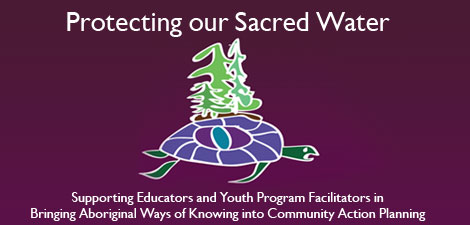Resources > Protecting Our Sacred Water
Protecting Our Sacred Water
Learning for a Sustainable Future’s education programs aim to promote responsible citizenship; children and youth who understand the interconnectedness of the environment, society and the economy and have the knowledge, skills, values and perspectives to take ethical and sustainable action on community issues. LSF promotes informed and compassionate action and recognizes the importance of local and indigenous knowledge in the development and implementation of community projects.
The Guide
Together with our partner organization, the Jane Goodall Institute of Canada, and a group of First Nation and Métis Elders and educators, the LSF has created a guide called “Protecting our Sacred Water.”
Protecting our Sacred Water helps educators and youth program facilitators bring education for sustainable development to their students/youth in a transformative way through action projects. The guide provides tools for teachers to help youth choose a project topic and how to carry it out through the integration of FNMI ways of knowing. It is important that Aboriginal youth; Canada’s fastest growing and most marginalized population, see themselves as leaders in creating change. When youth are meaningfully engaged throughout the entire process, they are more likely to make positive changes for themselves and their community.
Curriculum Connections
This guide helps students to achieve learning outcomes of curriculum across Canada. It is not something ‘extra’. Students learn ‘through’ the development and implementation of their action projects, rather than ‘about’ action.
Funding to support action projects initiated and completed by students is available through LSF’s EcoLeague program.
Project Partner
The Jane Goodall Institute of Canada (JGI) supports wildlife research, education and conservation. The Institute promotes informed and compassionate action to improve the environment, which is shared by all Earth’s living creatures, and recognizes the importance of local and Indigenous knowledge in the development and implementation of development projects.
JGI’s education programs all around the world aim to promote sustainable citizenship; children and youth who understand the interconnectedness of the environment, society and the economy and have the skills, values and knowledge to take ethical and sustainable action on community development and conservation issues. JGI achieves this by providing professional development, resources and support to educators. Please visit www.janegoodall.ca/
Why Focus on Water
- Many FNMI communities and other communities in Canada are faced with water issues every day, including no access to potable water.
- Water is sacred.
- Less than 1% of all water on Earth is “usable” fresh water.
- Almost every living organism relies upon water for survival.
- Our bodies are 66% water and require water to live.
- We play in water.
- Many modern manufacturing processes rely upon water.
- Our food requires water to grow.
Despite all of this, we are not being careful with this sacred resource.
Water and Creation Stories
Storytelling is integral to Aboriginal ways of knowing. Protecting our Sacred Water includes a couple of traditional stories from both Canadian and Uganda indigenous groups. We would like to grow a bank of Creation and water stories for educators and program facilitators to access. Please share with us a meaningful Creation or water story from your community.

